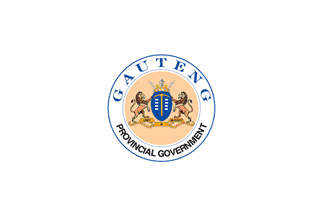 image by Martin Grieve, 07 Nov 2006
image by Martin Grieve, 07 Nov 2006
Last modified: 2011-06-10 by bruce berry
Keywords: gauteng |
Links: FOTW homepage |
search |
disclaimer and copyright |
write us |
mirrors
In north eastern South Africa, reorganized from
the former south central
Transvaal.
It borders the Free State, Mpumalanga,
Northern and North-West
provinces.
Antonio Martins, 30 May 1999
 image by Martin Grieve, 07 Nov 2006
image by Martin Grieve, 07 Nov 2006
The Gauteng provincial government flies a LOB - the provincial logo in the centre of a white field.
This is not considered the flag of the province, but its use is similar
to that of a corporate house flag, being flown at provincial government
offices only.
Bruce Berry, 07 Nov 2006
![[Coat of Arms of Gauteng]](../images/z/za)gt.jpg) image from this
site, reported by JJ Andersson, 05 May 2002
image from this
site, reported by JJ Andersson, 05 May 2002
ARMS: Azure, a pick erect Or, accompanied on either side by four shield
thongs in pale Argent; the shield ensigned of a coronet comprising a wreathed
head ring alternately Argent and Or, heightened of four chemical symbols
for iron Argent, alternating with as many honey-bees volant Or.
SUPPORTERS: Two lions proper.
SPECIAL COMPARTMENT AND MOTTO: Upon three gold staves fesswise, conjoined
2 and 1, supported by two ornamental brackets Or, the motto UNITY IN DIVERSITY.
Registered with the South African Bureau of Heraldry on 20 March 1996.
JJ Andersson, 05 May 2002
Vanderbijlpark Town
Council flag registered with the South African Bureau of Heraldry on 14 Apr 1971and
described as:
Per pale Gules, Argent and Vert; on a roundel Argent the
shield of the municipal arms.
Parys municipality flag registered with the
South African Bureau of Heraldry on 18 Apr 1975 and described as:
A rectangular flag per pale red, white and blue, the middle
stripe charged with the shield of the Municipal arms.
Boksburg Town
Council flag registered with the South African Bureau of Heraldry on 3 Apr 1984
and described as:
On a rectangular yellow field proportion three by two,
bordered red, a blue griffin segreant coward, armed and langued red,
and in each corner a red tulip.
Randburg Town Council flag registered with the
South African Bureau of Heraldry on 16 Oct 1987 with the following description:
A rectangular flag with proportion three by two, consisting
of nine horizontal stripes, from top to bottom green, yellow, red, yellow,
blue, yellow, red, yellow and green, respectively 1/10, 1/25, 1/50,
1/25, 3/5, 1/25, 1/50, 1/25 and 1/10 the height of the flag, the blue stripe
charged in the hoist with a white castle triple-towered and in the
fly with four yellow roundels barwise, the diameter of each 1/5 the
height of the flag.
Source: Data
of the Bureau of Heraldry on registered heraldic representations.
Mark Sensen, 19 May 2002
Illustrations of the above, with the
exception of Mokwana, can be seen in SAVA Journal 1/92 [brL92] (ed).